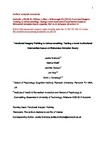Functional Imagery Training to reduce snacking: Testing a novel motivational intervention based on Elaborated Intrusion theory
| dc.contributor.author | Andrade, Jackie | |
| dc.contributor.author | Khalil, M | |
| dc.contributor.author | Dickson, J | |
| dc.contributor.author | May, Jon | |
| dc.contributor.author | Kavanagh, DJ | |
| dc.date.accessioned | 2016-02-17T13:25:16Z | |
| dc.date.available | 2016-02-17T13:25:16Z | |
| dc.date.issued | 2016-02-09 | |
| dc.identifier.issn | 0195-6663 | |
| dc.identifier.issn | 1095-8304 | |
| dc.identifier.uri | http://hdl.handle.net/10026.1/4336 | |
| dc.description.abstract |
Functional Imagery Training (FIT) is a new theory-based, manualized intervention that trains positive goal imagery. Multisensory episodic imagery of proximal personal goals is elicited and practised, to sustain motivation and compete with less functional cravings. This study tested the impact of a single session of FIT plus a booster phone call on snacking. In a stepped-wedge design, 45 participants who wanted to lose weight or reduce snacking were randomly assigned to receive a session of FIT immediately or after a 2-week delay. High-sugar and high-fat snacks were recorded using timeline follow back for the previous 3 days, at baseline, 2 and 4 weeks. At 2 weeks, snacking was lower in the immediate group than in the delayed group, and the reduction after FIT was replicated in the delayed group between 2 and 4 weeks. Frequencies of motivational thoughts about snack reduction rose following FIT for both groups, and this change correlated with reductions in snacking and weight loss. By showing that FIT can support change in eating behaviours, these findings show its potential as a motivational intervention for weight management. | |
| dc.format.extent | 256-262 | |
| dc.format.medium | Print-Electronic | |
| dc.language | en | |
| dc.language.iso | en | |
| dc.publisher | Elsevier | |
| dc.subject | Cognitive | |
| dc.subject | Psychological | |
| dc.subject | Motivation | |
| dc.subject | Behaviour change | |
| dc.subject | Craving | |
| dc.subject | Snacking | |
| dc.title | Functional Imagery Training to reduce snacking: Testing a novel motivational intervention based on Elaborated Intrusion theory | |
| dc.type | journal-article | |
| dc.type | Article | |
| plymouth.author-url | http://www.plymouth.ac.uk/staff/jackie-andrade | |
| plymouth.volume | 100 | |
| plymouth.publication-status | Accepted | |
| plymouth.journal | Appetite | |
| dc.identifier.doi | 10.1016/j.appet.2016.02.015 | |
| plymouth.organisational-group | /Plymouth | |
| plymouth.organisational-group | /Plymouth/Admin Group - REF | |
| plymouth.organisational-group | /Plymouth/Admin Group - REF/REF Admin Group - FoH | |
| plymouth.organisational-group | /Plymouth/Faculty of Health | |
| plymouth.organisational-group | /Plymouth/Faculty of Health/School of Psychology | |
| plymouth.organisational-group | /Plymouth/REF 2021 Researchers by UoA | |
| plymouth.organisational-group | /Plymouth/REF 2021 Researchers by UoA/UoA04 Psychology, Psychiatry and Neuroscience | |
| plymouth.organisational-group | /Plymouth/REF 2021 Researchers by UoA/UoA04 Psychology, Psychiatry and Neuroscience/UoA04 REF peer reviewers | |
| plymouth.organisational-group | /Plymouth/Research Groups | |
| plymouth.organisational-group | /Plymouth/Research Groups/Centre for Brain, Cognition and Behaviour (CBCB) | |
| plymouth.organisational-group | /Plymouth/Research Groups/Centre for Brain, Cognition and Behaviour (CBCB)/Behaviour | |
| plymouth.organisational-group | /Plymouth/Research Groups/Centre for Brain, Cognition and Behaviour (CBCB)/Cognition | |
| plymouth.organisational-group | /Plymouth/Research Groups/Institute of Health and Community | |
| plymouth.organisational-group | /Plymouth/Research Groups/Plymouth Institute of Health and Care Research (PIHR) | |
| plymouth.organisational-group | /Plymouth/Users by role | |
| plymouth.organisational-group | /Plymouth/Users by role/Academics | |
| dc.publisher.place | England | |
| dcterms.dateAccepted | 2016-02-09 | |
| dc.rights.embargodate | 2017-2-11 | |
| dc.identifier.eissn | 1095-8304 | |
| dc.rights.embargoperiod | 12 months | |
| rioxxterms.versionofrecord | 10.1016/j.appet.2016.02.015 | |
| rioxxterms.licenseref.uri | http://www.rioxx.net/licenses/under-embargo-all-rights-reserved | |
| rioxxterms.licenseref.startdate | 2016-02-09 | |
| rioxxterms.type | Journal Article/Review |


